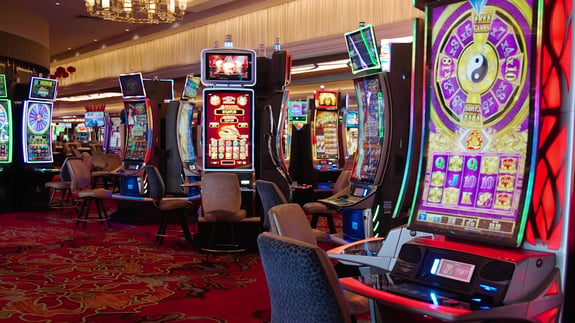Gambling has been an essential part of human recreation for millions of years, transforming through cultures and periods to become the exciting casino games we know today. From the historical Chinese and Romans, who engaged in multiple forms of gambling and chance, to the modern gaming floors of contemporary casinos, the allure of risk and winning has fascinated individuals across the globe. The shift from basic dice games and rudimentary betting setups to the lavish environments of contemporary casinos reflects significant strides in both social norms and technological.
As societies evolved, so too did the complexity of gambling activities, with gambling activities emerging as a distinct category of entertainment and thrills. These games have changed from casual gatherings centered around traditional tables to sprawling, opulent establishments designed to attract players. Today, we explore this fascinating journey, examining how traditional practices laid the foundation for the diverse and thrilling casino games that bring pleasure to millions worldwide.
spintax
Early Gambling Traditions
Gambling has profound roots in human past, with proof of games of chance dating back to ancient societies. Archaeologists have uncovered that as far back as 3000 BC, the people of China were using basic forms of betting with dice made from ivory. Similarly, ancient cultures of Mesopotamia engaged in gambling activities, often relying on the throwing of lots or dice to determine results. These early forms of gambling served not only as recreation but also played important roles in social and cultural practices.
The people of Egypt also were involved in gambling activities, with games that included betting on the outcomes of various occurrences, including sports and spiritual festivals. Items such as dice and depictions of players from ancient tombs demonstrate that gambling was a popular pastime. It provided both entertainment and a means of engaging in social connections, often linked to joyful occasions or major gatherings. This behavior demonstrated the universal appeal of chance and competition throughout the ages.
In ancient Rome, wagering became a commonplace practice among the people, as reflected by references in literature and the establishment of guidelines around certain games. Romans enjoyed a variety of gambling activities, from wagering on horse races to playing games like modern-day board games. The legal structure surrounding these activities began to take shape, establishing the foundations for betting regulations that would evolve in the centuries to come. The fame of betting during this period set the stage for the development of gambling house games in the future.
The Progression of Casino Games
Casino games have experienced notable transformations from their origins to the modern-day entertainment selections. In ancient civilizations, gaming was commonly linked to ceremonial practices, with games of dice found in Mesopotamia and wagering on the outcomes of events in classical Rome. These primitive forms of gambling laid the basis for the structured games we see today. The shift from informal gambling to systematic games took place as societies began forming rules and venues for wagering, showing cultural values and practices. lu88
The medieval period saw the rise of card games, which gained popularity among European nobility. Games like first and the game baccarat became mainstays in social gatherings. The development of printing technology additionally aided the spread of playing cards, making them more available to the common people. As gambling houses began to multiply, these card games developed into different forms that catered to wider audiences, eventually leading to the creation of casinos as exclusive venues for gaming.
The twentieth century marked a pivotal point in the development of casino games, with the ascendancy of commercial casinos in Vegas and other gaming hubs. This era introduced games like video slots and modern versions of table games, complete with sophisticated graphics and detailed betting structures. The introduction of online casinos in the tail end of the 1990s also transformed the gaming industry, allowing players to access a vast array of casino games from the safety of their homes. Today, casino games go on to evolve, blending traditional elements with cutting-edge technology to create captivating experiences for players around the globe.

Contemporary Gambling Regulations
In these years, the landscape of gambling regulations has changed substantially, particularly as technology and internet-based gambling have become more prevalent. Authorities around the globe have enacted numerous regulations and standards to make certain that gambling activities are conducted equally, with responsibility, and clearly. These laws often encompass elements such as licensing, marketing, gambler safeguards, and responsible gambling measures. Authorities aim to minimize issues such as gambling addiction and fraudulent activities while supporting a fair gambling environment.
The emergence of internet casinos has created a need for a new approach to regulation. Many jurisdictions have created specific internet-based gaming structures that serve online gambling, allowing operators to provide their services legally. These frameworks often demand operators to obtain licenses, adhere to strict security standards, and provide assistance options to help players. By closely observing internet activities, regulators can better protect players from potential harm and make sure that gaming is carried out in a secure manner.
Additionally, modern gambling regulations are increasingly focusing on sensible gaming initiatives. Many gaming establishments and internet-based platforms now implement features such as self-exclusion, financial limits, and breaks to help players manage their gaming habits. Awareness campaigns aimed at raising awareness about the dangers of gambling are also widespread. As the sector continues to grow, the focus on responsible gambling remains a fundamental principle of governing efforts, showing a dedication to encouraging a secure and enjoyable gaming experience for all players.